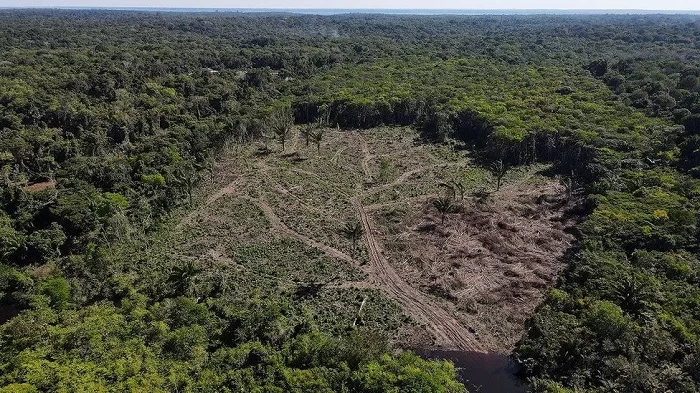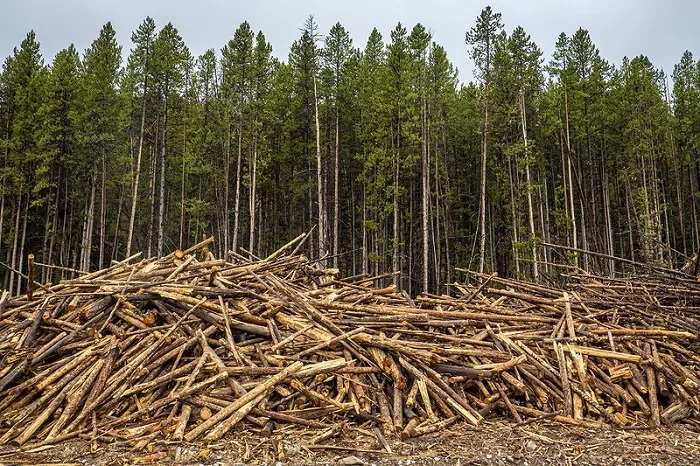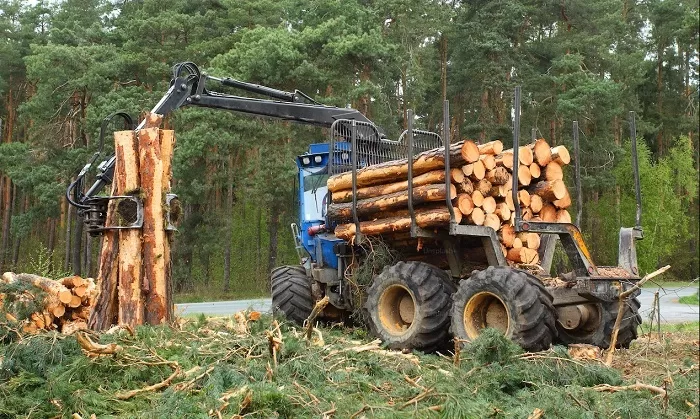Resources
Inclusive Conservation: Brands Forge New Alliances with Indigenous Peoples to End Deforestation

- Nestle, Mars Inc, and 3M have joined forces with Tsay Keh Dene First Nation in British Columbia to protect culturally significant land by offering their support.
- As they strive to accomplish their zero-deforestation objectives in supply chains, a few brands are now focusing on protecting the land rights of indigenous peoples.
- Indigenous land rights in Brazil are associated with significantly higher rates of forest protection, with the increase following an exponential trend, according to a study.
- The Earthworm Foundation and Rights and Resources Initiative are working together to speed up the implementation of optimal business practices by corporations.
- Nestle and Mars received a D grade from the Rainforest Action Network for their insufficient efforts in preventing deforestation, peat exploitation, and worker exploitation in their palm oil supply chains in Indonesia.
Deep within the heart of British Columbia lies a vast sub-boreal forest that serves as a crucial testing ground for a worldwide shift in the approach that consumer product companies are taking to achieve their goals of deforestation-free supply chains and mitigating the impacts of climate change.
A vast expanse of 3.2 million hectares rich with lodgepole pine, spruce, and other valuable timber is at the center of an unlikely partnership between the Tsay Keh Dene First Nation, who have inhabited the area for centuries, and several global consumer powerhouses – Nestle, Mars Inc., and 3M. These corporations rely on the region’s lumber and wood pulp to support their intricate supply chains, particularly for their product packaging requirements.
What sets this partnership apart is that the Tsay Keh Dene have full control: all the companies involved have pledged to back the First Nation’s management plans for the region, which entails safeguarding important areas with cultural significance from any undesirable harvesting activities for pulp and paper.
The company is conveying its expectations to its suppliers who operate in the region and funding satellite monitoring to ensure that no logging or road construction activities occur in protected areas.
The Canadian government has faced criticism for its past actions in the Tsay Keh Dene territory. However, in more recent times, Ottawa has expressed a commitment to acknowledging and respecting the rights of the Tsay Keh Dene.
“The First Nation wants economic development, they want to make a living, but there are certain regions they don’t want touched,” said Bastien Sachet, chief executive of the Earthworm Foundation, a nonprofit specialising in sustainable supply chains, which brought the parties together starting in 2019.
“The key is that they have a voice in how their land is being managed,” he added. “That’s a game changer.”

In recent years, the issue of deforestation has been a growing concern as companies have failed to meet their no-deforestation commitments. In response, some consumer companies are now prioritizing the protection of indigenous people’s rights. This is especially important for commodities such as palm oil, beef, soy, and wood products, which are major drivers of deforestation and contribute to the acceleration of climate change. These commodities alone are responsible for over 50% of tropical deforestation, which equates to the destruction of 10 soccer fields every minute.
Nestle changed its strategy in 2021 after it was unable to achieve its no-deforestation targets in 2020. The company introduced a more comprehensive “forest-positive” approach that upholds its commitment to zero deforestation, while also giving priority to the restoration of forests and the promotion of land rights, sustainable livelihoods, and the well-being of indigenous peoples and local communities.
“Focusing on deforestation alone is not sufficient. We also need to have an active role in conserving and restoring the landscapes, and empowering local communities, that are part of our supply chains,” said Michele Zollinger, global sustainable sourcing for pulp and paper lead at Nestle.
Nestle announced in December 2021 that the majority of its supply chains for meat, palm oil, pulp and paper, soy, and sugar were free from deforestation, with a rate of 97.2%. However, there are still significant exclusions, particularly with respect to the supply chains for its most well-known products: cocoa and coffee.
Governments worldwide are scrambling for new ways to slow forest and biodiversity losses and escalating climate impacts, and the new emphasis on indigenous rights is a significant part of this larger pendulum-swing.
In December, a global agreement was approved by 196 governments to safeguard 30% of the world’s lands and oceans by 2030, which was a significant milestone. The previous year, during the international climate talks, private philanthropies and governments pledged $1.7 billion to support the efforts of indigenous and local communities in protecting their rights and lands.
According to recent estimates, the combined population of indigenous peoples, local communities, and Afro-descendant people is approximately 2.5 billion individuals worldwide. These groups have historically claimed nearly half of the world’s lands and forests, yet they hold legal rights to less than 20% of these areas. However, their role as the most effective custodians of forests and other landscapes is widely acknowledged, particularly when they have been granted legally recognised land rights. Recent research conducted in Brazil’s Atlantic Forest revealed significantly higher rates of forest protection in territories where indigenous populations had obtained legal land rights, indicating the importance of recognising and supporting their land tenure rights.
Rebuilding trust with indigenous communities will be a challenging task for companies aiming to support their rights, given the long history of mistreatment inflicted upon them by European colonizers, as well as modern-day agri-businesses. The increasing demand for consumer products such as palm oil and beef, driven by population growth and improving living standards, has led to negative consequences including displacement, loss of livelihoods, and environmental damage. These impacts have been particularly harmful to indigenous communities.
Between January 2015 and August 2022, the Business & Human Rights Resource Centre recorded 883 instances of violations against human rights defenders from indigenous communities, which included acts such as killings, arbitrary detention, and threats. The majority of these violations (95%) were directed towards individuals advocating for climate, land, and environmental causes. Among the sectors implicated in these violations, agribusiness companies ranked second, following only mining in terms of the number of attacks.

The director of rights and livelihoods at the nonprofit global coalition Rights + Resources Initiative, Bryson Ogden, expressed that the initiative taken by Tsay Keh Dene is a commendable instance of successful collaboration between companies, civil society, and indigenous groups towards the protection of community land rights.
Although the $1.7 billion of government funding for indigenous peoples is a positive development, it only represents a small step towards addressing the issue. However, there has also been progress among corporations, particularly well-known consumer brands, which have implemented land tenure and indigenous rights policies. However, it is important to note that this shift is still in its early stages, and these policies have not yet fully permeated supply chains.
Nestle published a detailed roadmap in February that outlines specific steps to ensure the respect of land rights for indigenous peoples and local communities in its operations, supply chains, and other business relationships, making it the first major brand to do so.
The Earthworm Foundation and the Rights + Resources Initiative (RRI) are playing a vital role in expediting the adoption of corporate best practices and establishing direct connections with local and indigenous community groups on the field. Additionally, RRI is spearheading the Interlaken Group, an informal coalition comprising companies, investors, and other organizations committed to ensuring the land rights of communities.
Partnerships of this nature are crucial, particularly for companies like Nestle, whose supply chains span across over 100 countries and involve a vast number of suppliers.
“It’s not feasible for us to be in 100 different countries with 100 different projects,” said Zollinger, who credits the Earthworm Foundation and RRI for helping to build better understanding and trust with indigenous and other local community groups.
The Earthworm Foundation has joined forces with Nestle and Mars to aid in the conservation of a diverse ecosystem situated in the southern part of Aceh province, Indonesia. This region is home to a wide range of wildlife such as orangutans, tigers, and ancient tropical forests. Together with the local communities, the initiative seeks to reduce deforestation by 50% by 2025 in the southern Aceh landscape, with a special focus on preventing deforestation in key areas including Aceh Singkil, Subulussalam, and Southern Aceh.
Environmental activists are now focusing on scrutinizing how brands are following through on their promises to protect indigenous peoples’ rights in their supply chains since their efforts to end deforestation by 2020 have been a complete failure. According to Gemma Tillack, the forest policy director at the Rainforest Action Network (RAN), the brands’ actions to safeguard indigenous peoples’ rights have been generally falling behind.
According to her observations, the Forest Positive Coalition of Action is primarily dedicated to enhancing smallholder growing techniques. However, she pointed out that the coalition appears to give little attention to promoting the acknowledgment of indigenous peoples’ land rights and ensuring their respect. It is worth noting that the coalition comprises 22 of the most prominent consumer goods retailers and manufacturers globally.
Each year, the Rainforest Action Network releases a Keep Forests Standing Report that rates the efforts of 17 companies and banks in preventing deforestation and upholding human rights in Indonesia. Recently, Nestle received praise from RAN for becoming the first brand to publish a specific action plan aimed at respecting the land rights of indigenous peoples and local communities. However, RAN has urged Nestle to swiftly implement the plan with its two primary palm oil and forestry suppliers in Indonesia, the Harita Group and Royal Golden Eagle Group.
According to RAN, there are insufficient policies in place to guarantee that indigenous communities can freely and knowingly grant or withhold their consent for development activities taking place on their lands.
According to a statement released by RAN, Nestle needs to implement this plan without delay in order to uphold the rights of the Long Isun and Pargaman-Bintang Maria indigenous communities. RAN further urges Nestle to move up the reporting date on the implementation of this plan from 2023 to 2025.
In RAN’s 2022 Keep Forests Standing report, Nestle and Mars received D grades and were also found to be involved in the Tsay Keh Dene First Nation partnership. Unilever, on the other hand, received a C grade and was the only brand that had a satisfactory “no deforestation, no peat, no exploitation” policy for all its commodity supply chains. Brands that were rated as poor performers, with an F grade, included Mondelez, Nissin Foods from Japan, and Procter & Gamble.
Sachet, at the Earthworm Foundation, agrees the industry has a long way to go. “While some companies are piloting such partnerships successfully, the vast majority of consumer companies are not yet aware of the indigenous territories their supply chains are impacting,” he said. “Hopefully this work can inspire them to get moving.




















































